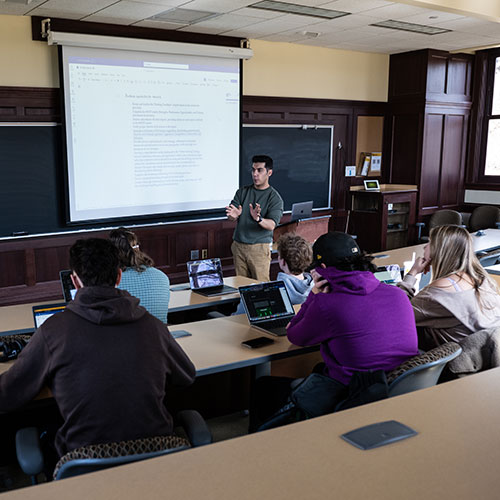
Real-world course experience in Urban Studio prompts new senior research avenues

Spring semester often focuses on senior Independent Study projects at The College of Wooster. But thanks to the launch of an updated junior I.S. experience in Urban Studio and other changes in the program curriculum and courses, there’s been growing interest from underclassmen at the College in declaring an urban studies major. In just two years, the program has grown from 3 to 18 declared majors—with zero seniors graduating in spring 2024.
Hamed Goharipour, assistant professor of urban studies and Middle Eastern & North African studies, worked with Heather Fitz Gibbon, professor of sociology and anthropology and department chair of urban studies, to revise the curriculum in 2020-21. “We took a look at trending topics at conferences and throughout the industry and decided to introduce four tracks focusing on specific areas within urban studies,” said Goharipour. Those tracks include urban affairs and policy, social justice and the city, global urban processes, and environmental sustainability and urbanism. The pair also added new courses called World Cities, Cities in Cinema, and Web-based GIS (an important requirement for majors to develop skills with Geographic Information Systems software), and changed the content and syllabi of important existing courses, including Contemporary Urban Issues and Social Justice & the City. But the most revolutionary impact, according to Goharipour, stems from the updated junior Independent Study experience in Urban Studio.
“I piloted this course in 2022 but changed 80% of the content for spring 2024,” said Goharipour. “Urban studies is a hands-on discipline with different competencies for students to acquire like teamwork real-world experiences. Traditional I.S. doesn’t respond to these competencies, but Urban Studio fixes that.”
While this semester’s class will still complete an I.S. proposal and in-person site visits around the City of Wooster to explore urban concepts, the first half of the semester has been spent working on a real-world project through the experiential learning platform, Riipen.
After learning about Riipen through Wooster’s Center for Advising, Planning, and Experiential Learning (APEX), Goharipour uploaded the class goals to the site and hoped to find a project that fit. As urban studies is an interdisciplinary field involving infrastructure and environmental analysis, policy, and economic development, all coming together to solve a problem, Goharipour wasn’t sure what kind of response to expect. In less than two weeks, he received four offers from companies interested in partnering with him. “We found a match with a firm that is working on the revitalization of Gary, Indiana,” said Goharipour. “This rust-belt city has been affected by post-industrial changes and lost population, so it hired a firm to bring it back to life.”
The project manager joined the class virtually for an interactive session to kick things off, and Goharipour set up a Microsoft Teams channel for the students to collaborate with the manager. They share files and ask questions as needed while collecting quantitative and spatial data (maps) from the census bureau, city reports, ArcGIS Online, etc. Students also completed related readings about the history of the town and story of the rust belt to better understand the existing conditions and conduct an analysis. By spring break, the students will suggest some strategies on how they can use Gary’s opportunities and strengths to overcome weaknesses and threats.
“Our client believes urban agriculture and farming with markets in public spaces, along with adding affordable housing units will provide some of the opportunities Gary needs,” said Goharipour. “This fits with placemaking and revitalization concepts the students have already learned. They are ready to suggest other strategies as well, and the client is open to their ideas and perspectives to help accomplish the project goals.”
Case Baumwart ’25 is a junior urban studies major from Rochester, New York who says this major is a perfect cross section of his three passions: design, sociology, and social justice. It also provides him with the skills to improve the lives of people in his community. “I feel a strong sense of internal motivation to do my best work so that our effort may help people and create tangible change in the Gary community,” said Baumwart. “The fact that we get to work on a real issue and put all the theory we have spent so much time learning into action makes this part of my educational journey incredibly rewarding.”
The Urban Studio experience has also been valuable to Ryan Gretlein ’25, who says the project is similar to those he would be working on post-graduation in an actual urban studies career. “Declining cities often have a lot of interconnected issues that can be difficult to identify, so it has been an enjoyable challenge to work with a team and use our own perspectives to address these issues,” said Gretlein.
The collective excitement around the project also prompted conversations about organizing a trip to Gary for students to meet people who play a role in the project, including some who can provide urban farmland. By the end of the semester, students in two groups of four will deliver visual group presentations back to the client, along with a written report.
Though the Riipen experience isn’t yet complete, it’s already inspired Goharipour to consider how he might incorporate a project into his World Cities class. “I want all classes to have hands-on experience, but this one is a challenge,” he said. “We usually cover eight to 10 cities with speakers, readings, and videos, but if I can find a project in Europe or South America, that would push a student to seek and explore data to relate it to other parts of the world.”
He’s also open to new ideas in terms of I.S. format, too. “Because urban studies cover visual topics, and things you hear and touch like transportation and housing, we are open to accepting different forms of I.S.” said Goharipour. “Written format is valuable, and I love to read students’ projects, but there are many topics you can convert to visual and audio formats like podcasts, videos, performances, and other things. Before students begin the real projects next year, this studio helps them level up ideas, and we will see how we can open new doors for future I.S. work.”
Posted in Experiential Learning, Independent Study, News on February 28, 2024.
Related Posts
Related Areas of Study
Urban Studies
An interdisciplinary program for those with a passion for the promises and challenges of the urban experience.
Major MinorSociology
The study of social life, social change, and the social causes and consequences of human behavior.
Major MinorAnthropology
Use problem-solving and research skills to explore and understand communities and cultures in every part of the world.
Major Minor

